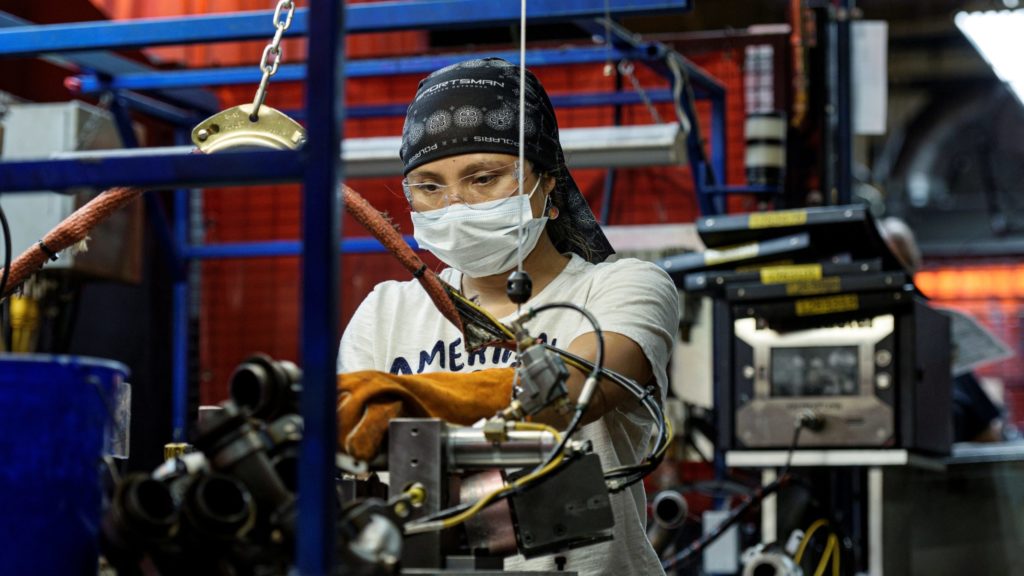Labor Day was created in New York City in 1882 to recognize the achievements of American workers. That purpose remains true today, but this year American bishops are also using the holiday to draw attention to the hardships many workers face.
“Dignified work reflects that we as humans play an active role in shaping the world around us,” said Bishop Mark Seitz of El Paso and Archbishop Borys Gudziak of the Archeparchy of Philadelphia. “Through our work, we determine how we provide for the material needs of ourselves and our families. God wants us to do more than just survive, but to thrive.”
“But in today’s economy, too many people and families live in poverty because they work in low-paying jobs that often offer few or no benefits, irregular hours, and inadequate protections,” Seitz and Gudziak said. “At the same time, union representation has declined, especially in the private sector, leaving workers with less protection and a weakened bargaining position.”
“We know that it does not have to be this way,” the prelates added.
Seitz and Gudziak, chairs of the U.S. Conference of Catholic Bishops’ Committees on Migration and on Domestic Justice and Human Development, issued the statement Aug. 28 in advance of Labor Day on Sept. 2. Labor Day has been a national holiday since 1894 and is celebrated annually on the first Monday in September.
Seitz and Gudziak called on society on this Labor Day to recommit to building a society that respects human dignity. They pointed out that the Catholic faith advocates for protections that allow workers to succeed. In particular, they highlighted the plight of immigrants and child laborers.
When it comes to immigrants, Seitz and Gudziak point out that while immigrants – whom many communities and industries rely on to fill labor shortages – have a positive impact on the economy, they are still mistreated at higher rates than their native-born counterparts. They cite human trafficking as a major problem that is still widespread, as well as general hostility and discrimination.
A congressional report released last September estimated that there are about 8.8 million illegal immigrants in the U.S. labor market. The main occupations they hold include maids and housekeepers, cooks, construction workers, farmers and landscapers, the report said.
“The church supports both workers and immigrants across the country, especially those who often work without protection in agriculture and other industries because of their immigration status,” Seitz and Gudziak said. “These workers contribute to the local economy, pay taxes and own homes. Yet they are often victims of wage theft and have legitimate fears of reprisal if they speak out about missing wages or unjust practices.”
Seitz and Gudziak blamed some of the existing problems on the lack of changes in the country’s immigration system, arguing that the current system “does not adequately address the needs of American families, employers, communities, or immigrants.”
“These deficits, combined with labor shortages, have increased opportunities for the exploitation of immigrants and led some to use children as additional labor,” Seitz and Gudziak said. “We have witnessed worrying attacks on the dignity of children, both native and immigrant, whose innocence has been exchanged for cheap – and often dangerous – labor.”
The latest government statistics confirm that child labor and violations of child labor laws have increased in recent years. Data from the U.S. Department of Labor for fiscal year 2023 (October 1, 2022 to September 30, 2023) show that there were 955 cases of violations of child labor laws, 5,792 minors were employed in violation, and $8,039,728 in civil fines were imposed for child labor.
These numbers are all the highest in the last decade – as far back as data goes. For comparison, in fiscal year 2022, data shows that there were 835 cases of child labor law violations, 3,876 minors were employed in violation, and $4,386,205 in civil fines were imposed for child labor.
“As the number of child labor law violations has increased dramatically in recent years, several states have also taken steps to further relax child labor standards, exposing young people to hazardous working conditions and long hours,” Seitz and Gudziak said. “The children of families living in poverty will suffer the most, but the innocence and dignity of all young people must be protected.”
Seitz and Gudziak said immigration reform is essential, if not comprehensive then at least in small steps, as well as measures that “promote, preserve and expand protections for all children.” They argue that it is possible to create a thriving economy with decent conditions for all workers.
“The Church offers a vision for the future that does not require our society to choose between a thriving economy, economic justice, decent conditions for all workers and the protection of the most vulnerable among us,” Seitz and Gudziak said. “Catholics have consistently called on civic leaders to recognize and protect the sacredness of the human person. We must reject an economy of exclusion.”

